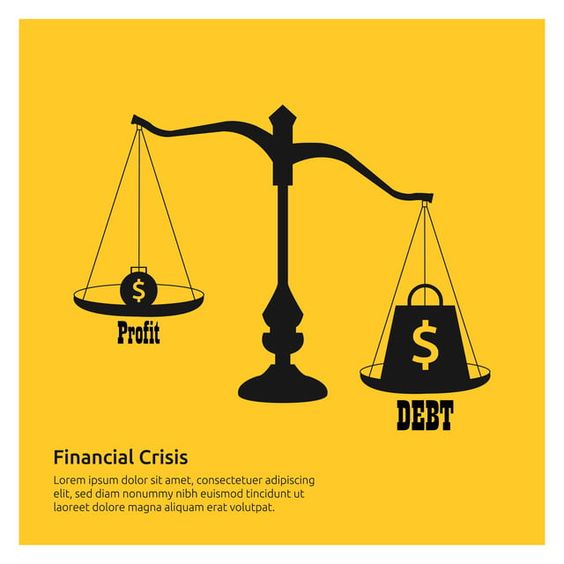What’s The Financial Crisis?

PinterestA financial crisis is a profound disruption in a country’s financial system, causing a sudden loss of trust in banks and financial markets. This can lead to economic turmoil, recessions, or depressions. Different types of financial crises share common traits. Banking crises occur when many banks face insolvency, sparking panic withdrawals. Currency crises involve significant currency devaluation due to speculation or trade imbalances. Debt crises arise when governments struggle to repay borrowed funds.
Asset price bubbles occur when excessive buying leads to financial instability. Systemic risk, like a domino effect, occurs when one institution’s failure affects others. Financial crises can result in bank closures, job losses, economic slowdowns, and reduced living standards. Governments and central banks often intervene to mitigate the impact by providing aid, implementing regulations, or injecting money into the system. Notable examples include the 2007-2008 global financial crisis, the 1997 Asian financial crisis, and the Great Depression in the 1930s. Addressing factors like asset bubbles and moral hazard is crucial for recovery.
How To Protect Yourself From A Financial Crisis

PinterestThere are a number of things you can do to protect yourself from the financial impact of a crisis:
Build Up An Emergency Fund: #Financial Crisis
Creating and growing an emergency fund is a crucial financial step, providing a safety net for unforeseen financial challenges. Start with manageable monthly contributions, automating transfers for consistency. Trim unnecessary expenses by revisiting your budget and consider ways to boost income. Once your fund covers three to six months’ expenses, consider investing the excess for long-term growth. Keep the fund separate, choose an account with a competitive interest rate, and regularly review and adjust it based on changing circumstances. Although building an emergency fund requires dedication, the peace of mind it brings is invaluable. #Financial Crisis
Pay Down Debt:
Clearing high-interest debts is a crucial step in preparing for a financial crisis, offering greater financial flexibility. To manage your debt effectively, start by budgeting, list your debts with interest rates, and prioritize paying off the high-interest ones first. Consider paying more than the minimum monthly amount to speed up repayment. Debt consolidation is an option for multiple high-interest debts. Despite the challenges, reducing debt enhances financial resilience, providing long-term peace of mind and securing your financial future.
Diversify Your Investments: #Financial Crisis

PinterestDiversifying your investments is a crucial strategy to safeguard against financial crises. This involves spreading your money across various assets, industries, and sectors to offset potential losses. To effectively diversify, invest in different asset classes such as stocks, bonds, and cash. Spread investments across various industries and sectors to minimize exposure to a single sector.
Utilize index funds and ETFs for cost-effective diversification, and regularly rebalance your portfolio to align with your goals and risk tolerance. Incorporating diversification into your investment strategy is fundamental for financial success, reducing risk and enhancing your chances of achieving your financial objectives.
Have A Financial Plan:
Building a robust financial foundation is essential to safeguard against financial difficulties. A well-structured financial plan serves multiple vital roles, such as translating financial dreams into clear objectives, monitoring income and expenses to make wise choices, budgeting to allocate resources effectively, and addressing debt to achieve financial freedom. Including savings in the plan establishes a foundation for retirement amidst an uncertain future.
Financial advisors can provide guidance in setting goals and navigating the financial journey. To fortify your financial plan, adhere to key principles: regularly update the plan, be honest in financial assessments, live within your means, stay flexible to adapt to challenges. In summary, a strong financial plan is the key to realizing dreams and protecting against the unpredictability of financial challenges.
Conclusion
In the face of a potential 2023 financial crisis, navigating the intricate global economy requires careful consideration. Diversifying investments across sectors and regions is crucial for financial resilience, mitigating risks associated with concentrated resources. Caution is advised against asset bubbles, which, though enticing, can lead to instability.
Staying informed about economic trends is empowering, helping individuals prepare for unexpected setbacks. Governments and financial institutions play vital roles in overseeing and regulating financial systems to balance stability and growth. Proactive measures can empower both individuals and the financial community to confront challenges confidently, aiming for a secure and resilient financial future in the complex global mosaic.





I’ve been following this blog for years and it’s amazing to see how much it has grown and evolved Congratulations on all your success!